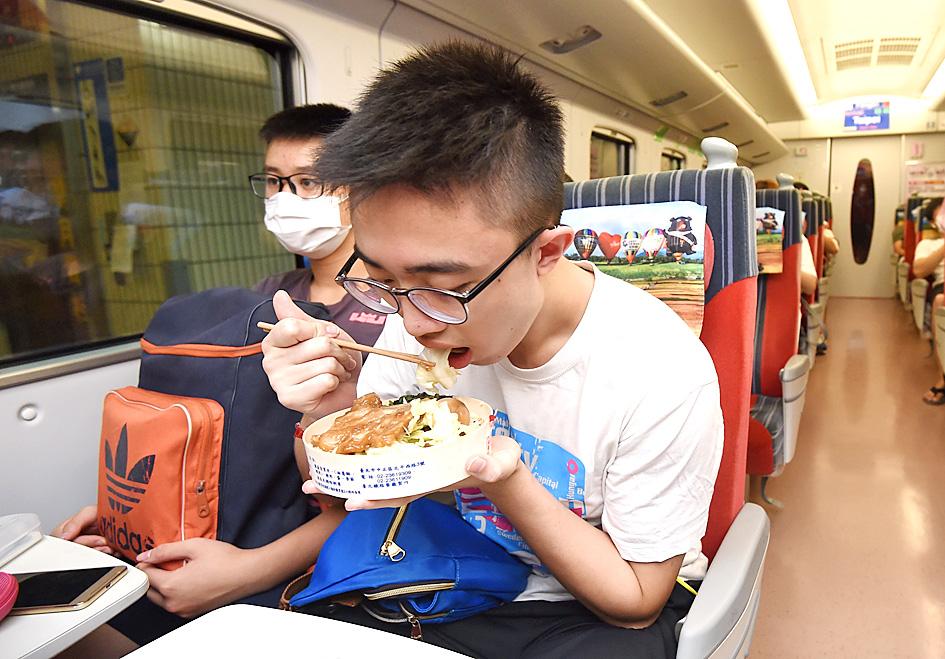The Ministry of Transportation and Communications is to reinstate a ban on eating and drinking on public transportation from Monday, to reduce the risk of COVID-19 transmission, it said yesterday.
Those who contravene the ban, approved by the Central Epidemic Command Center (CECC), face fines of NT$3,000 to NT$15,000 (US$106 to US$528) under the Communicable Disease Control Act (傳染病防治法), the ministry said.
It would soon put up notices about the ban at transportation venues, the ministry said.

Photo: Chien Jung-fong, Taipei Times
The ban applies to Taiwan Railways Administration (TRA) and Taiwan High Speed Rail Corp (THSRC) trains, but not tourist trains, it said.
Eating and drinking on buses, boats (excluding regular dining areas) and airplanes (excluding international flights), as well as at post offices, would also be prohibited, it said.
Those who need to drink water, take medication or breastfeed are exempt from the ban, but must put on masks after eating or drinking, it added.
At railway platforms and stations, passengers can remove their masks to eat, but only while practicing social distancing, it said.
In addition, the THSRC would only offer reserved seating from Feb. 8 to Feb. 16, while the TRA would limit the number of standing passengers on intercity train services to no more than 15 per car, or about 120 per train, the ministry said.
The ministry would also order more frequent disinfection services at airports, railway and high-speed rail stations, highway and shipment services areas, and tourist spots, it added.
To prevent mass gatherings, the TRA and THSRC would halt or postpone rentals of public spaces, it said.
In other news, the Fisheries Agency yesterday announced draft rules to hold accountable operators of vessels flying flags of convenience for employees breaking quarantine rules.
The draft amendments to the Regulations on the Management and Approval of Foreign Flag Fishing Vessels Entering into Ports of the Republic of China (非我國籍漁船進入我國港口許可及管理辦法) would require the operators to monitor and manage the activities of their workers who enter Taiwan on their vessels, it said.
There are nearly 238 such vessels managed by Taiwanese, agency Deputy Director-General Lin Kuo-ping (林國平) said.
Sailors on these vessels can apply to enter Taiwan for ship maintenance or supplies, but they are still required to undergo 14-day quarantine or face fines of NT$100,000 to NT$1 million, he said.
Operators who fail to manage their workers face fines of NT$500,000 to NT$1 million, he added.
The amendments are in line with the CECC’s order that all government agencies clarify disease prevention rules, Lin said.
The changes are to take effect from late next month or early March, he said.

RESOLUTIONS DEBATE: Taiwan’s allies said that UN and WHA resolutions cited by China and other nations ‘do not determine Taiwan’s participation in WHO activities’ A proposal to invite Taiwan to this year’s World Health Assembly (WHA) was rejected on Monday, resulting in Taipei’s absence from the annual meeting for a ninth consecutive year, although partners spoke up for Taiwan’s participation at the first day of the meeting. The first agenda item after the opening was a “two-on-two debate” on a proposal to invite Taiwan to participate at the WHA as an observer. Similar to previous years, two countries made statements in favor of the proposal, while two others expressed their opposition. Philippine Secretary of Health Teodoro Herbosa, president of the 78th WHA, accepted the WHA General Committee’s

Palauan President Surangel Whipps Jr arrived in Taiwan last night to kick off his first visit to the country since beginning his second term earlier this year. After arriving at Taoyuan International Airport at around 6:30 pm, Whipps and his delegation were welcomed by Minister of Foreign Affairs Lin Chia-lung (林佳龍). Speaking to gathered media, the Palauan leader said he was excited and honored to be back in Taiwan on his first state visit to Taiwan since he was sworn in this January. Among those traveling with Whipps is Minister of State Gustav N. Aitaro, Public Infrastructure

Premier Cho Jung-tai (卓榮泰) on Friday laid out the Cabinet’s updated policy agenda and recapped the government’s achievements ahead of the one-year anniversary of President William Lai’s (賴清德) inauguration. Cho said the government had made progress across a range of areas, including rebuilding Hualien, cracking down on fraud, improving pedestrian safety and promoting economic growth. “I hope the public will not have the impression that the Cabinet only asked the legislature to reconsider a bunch of legal amendments,” Cho said, calling the moves “necessary” to protect constitutional governance and the public’s interest. The Cabinet would work toward achieving its “1+7” plan, he said. The

Nvidia founder and CEO Jensen Huang (黃仁勳) hosted a dinner in Taipei last night with key Taiwanese suppliers to celebrate the successful mass production of the company’s new Blackwell AI systems. Speaking to the media earlier yesterday, Huang thanked Nvidia’s Taiwanese partners for their contributions to the company’s ecosystem, while also sharing his plans to meet with Taiwan Semiconductor Manufacturing Co (TSMC) founder Morris Chang (張忠謀). In response to rumors that Nvidia will launch a downgraded Hopper H20 chip for China in July, Huang dismissed the reports, saying, “That is not true.” He clarified that there